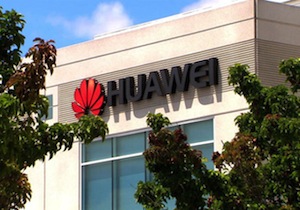Clearwire to use Huawei tech in upgrade, despite U.S. warning

Clearwire has said it will integrate Huawei technology as part of its high-speed wireless network upgrade, due to begin construction in 2013.
According to Reuters, the upgrade has the U.S government's "blessing", in spite of a recent U.S. House Intelligence Committee report warning U.S. companies to steer clear of Chinese telecoms equipment makers, notably Huawei and ZTE.
The cellular firm said it had reviewed the proposed plans with the "technical arms of multiple agencies" with the view that it has "great respect" for the U.S. government's role in overseeing the country's infrastructure.
But it's not clear which parts of the network will run Huawei technology, or whether the Chinese firm's equipment will be limited to areas that are set apart from data transfer sections.
A Clearwire spokesperson confirmed that there are "no longer any domestic suppliers for radio base station infrastructure equipment," and that "Samsung and Huawei base stations are deployed at the edge of our network, while the 'brains' our core network are being supplied by domestic [U.S.] vendors like Cisco and Ciena."
Sprint, the largest Clearwire shareholder, plans to use the new upgraded high-speed network to boost its own service for Sprint customers.
Clearwire already uses Huawei technology as part of its critical network, but its technology represents less than 5 percent of the total budget for the upgrade. Clearwire told ZDNet that this figure will be "materially reduc[ed]" in its LTE network.
The firm told Reuters that its cellular hardware partners and telecoms equipment makers must pass "extensive testing" by a third-party firm that is approved to undertake such tasks by the U.S government, as part of vetting efforts to ensure the utmost security of critical network infrastructure.
Clearwire chief technology officer John Saw told ZDNet in a statement: "Out of an overabundance of caution, we are subjecting every LTE base station vendor to a Trusted Delivery Program whereby we require that all of our vendors' base station and software pass extensive testing by a U.S. government-approved third party company recognized for vetting critical infrastructure systems for security weaknesses and threats."
South Korea-based Samsung and U.S.-based Cisco will also play a part in building the network, while Sweden-based Ericsson will maintain the network.
U.S. warning bells
The U.S. House Intelligence Committee warned U.S. companies not to trust Huawei and ZTE for fears that the Chinese government could commit espionage against the U.S. through cyber-hacking or network penetration.
However, Huawei has regularly defended itself against such accusations, and even took to penning a detailed report to claim that the company was not working on behalf of the ruling Chinese Liberation Army.
In spite of the report, much of the onus of proving that Huawei was not spying on the U.S. or would allow a third-party or a state to use its equipment for attacking another country was put on the company itself. The U.S. House may well have elevated suspicion but has yet to fork out any solid evidence. In a nutshell: nothing has yet been proven and hard evidence has yet to be produced by the U.S. government.
However, a subsequent White House report appeared to refute the U.S. House committee's fears. A Reuters report said a review had been carried out and there was "no clear evidence of spying" found by Huawei. That said, the White House denied that any such investigation took place when pressed for comment.
On the other side of the pong, Huawei's chief executive Ren Zhengfei visited Downing Street after the firm pledged to invest $2 billion into the U.K. economy. Despite the friendly handshakes and charming chit-chat between the Huawei chief and the British Prime Minister, only a few weeks later the U.K. parliamentary intelligence and security committee said it would also investigate the firm's relationship with British Telecom, the U.K.'s largest telecoms firm.
The committee's probe comes at a time when Huawei is set up firmly in the country already, and has spent millions on a U.K.-based testing facility where Huawei products can be tested and vetted by the U.K.'s security services.
For the U.S., however, as noted in the recent ZDNet Great Debate, while Huawei has for some time been a "political punching bag," the Chinese telecoms giant can begin to work its way up the U.S. chain by proving itself as a worthy and reliable -- and above all else, secure -- maker of equipment by such contracts with Clearwire, for instance.
Updated at 12:10 p.m. GMT on October 30: with additional material from Clearwire.
